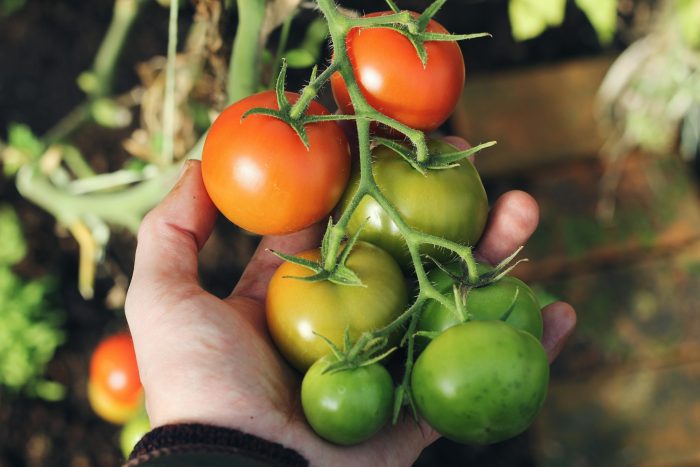{*Did you know you can write on Elephant? Here’s how—big changes: How to Write & Make Money or at least Be of Benefit on Elephant. ~ Waylon}
~
No one grew a tomato like my dad.
When I was a child, my father‘s vegetable garden expanded with each passing year.
He started small, but as it was with most of the hobbies he enjoyed, it became a mushroom cloud of passion coupled with an obsessive, diligent work ethic. He was happiest doing the things he loved, even when they frustrated him. Did he appreciate the end results a bit more because of the time and effort they required? I think so, yes. I can relate.
In the spring he’d start from scratch. Seed packets, special soil, and a “growing center” he built himself—a shelved unit that stood like a bookcase with no back, rigged with lights. When the sprouts were hearty and thick (and after the final frost) into the ground they went.
He grew all sorts of things. Squash, peppers, green beans, cucumber. I remember vividly the neat rows of plants, the mounds, and the stakes. I remember the conical bean towers, too, and the delicate flowers that appeared before the zucchini started to swell. As he honed his skills, each summer became an epic quest for the perfect harvest. Tomatoes were his specialty.
He retrieved chicken manure from the The Farm around the corner, and he was quite convinced this was his secret weapon for growing spectacular produce. He put down straw between the plants and was steadfast in maintaining a weed-free patch.
I can still see our two little Dachshund pups trotting through the garden, and my little sister toiling away alongside my dad, absorbing both his devotion and wisdom. Having a green thumb runs deep in my family, but having a green thumb is more about work than talent. Smudged faces, dirty hands, muddy knees…the blood, sweat, and tears are all part of the formula.
I’m not sure why he decided tomatoes were his thing, but they were. He grew different varieties. He made jars of sauce, he canned them skinless and whole, and he enjoyed eating them raw, freshly sliced with just a little salt and pepper. Season after season, he grew his tomatoes.
After we moved from Mt. Tom Road to the lake house, he still kept a small vegetable garden. When he retired, he thought it would be fun to have a tomato growing contest, so he had me write up a satirical “rules and regulations” piece for himself and his friends. He even carved a tomato, painted it, and glued it to an ornate, wooden candlestick. It’s who he was—the guy who delighted in faux rivalry among his buddies and went the distance by making a trophy for the winner to proudly display. Sadly, I think the contest only lasted a year because he passed away the following June. The Tomato Trophy stoically sits on the mantle at my mother’s house.
All this and one memory stands out the strongest. It was the year he grew so many tomatoes he couldn’t keep up with the abundance. We had to brown bag them and peddle them around the neighborhood—not just ours, but my grandmother’s too. A good side hustle runs in my family too.
With hobbies, my dad became singularly focused, but it always seemed to be fun and satisfying for him, despite the labor involved. He created work for himself for sure, but in doing so, he forged a purpose. His interests gave him something to think about, study, and understand. He took most of the things he enjoyed to another level: ice fishing, wood carving, cooking, gardening—he was an inexperienced student first, but then an expert.
My father‘s tomatoes were the stuff of legend. They were big and juicy, and the best part about them was how proud he always was of his accomplishment. He taught me that if you put in the work, achievement comes eventually. It’s why I (generally) have to finish the things I start—like house cleaning, a painting, or a piece of writing. That’s all there is to it. Small things like filling a hole with a seed can lead to a big reward such as a fat, ripe, juicy tomato but not unless we water it and weed around it and trim it and watch it and give it as much sun as possible.
Our hopes and dreams need this kind of attention too.
Watching things grow takes patience. This could be said of children, of course, but also of our quest to be better and live a “better” more purposeful life.
Here’s what my father’s tomatoes taught me:
1. There is nothing quite like a a job well done and a job done to completion. The feeling we get from our own journey and the accomplishment thereafter is not something we can purchase.
2. Learning something new requires time and repetition.
3. An honest day’s work requiring physicality is the perfect antidote for stress relief and a healthier mental state.
4. We have no idea how inventive or creative we are until we let go of our ego and figure out the puzzle ourselves.
5. Our joy is greater during the journey, not when it’s complete, because the journey does not end.
Cultivating anything means we are cultivating happiness for ourselves. Happiness comes from the process, not so much the result, but the result of the process (especially when time and energy is invested fully) is a fabulous tasting fruit.
My father’s tomatoes taught me why it’s so important to walk the path of the “unknown” and explore my creative side. These are the moments that keep me inspired to live fully, step away from my phone and self-sabotage, flip my negative talk on its ass, and engage in my own talent.
~
{Please consider Boosting our authors’ articles in their first week to help them win Elephant’s Ecosystem so they can get paid and write more.}


 Share on bsky
Share on bsky





Read 3 comments and reply